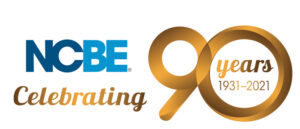This article originally appeared in The Bar Examiner print edition, Summer/Fall 2021 (Vol. 90, Nos. 2–3), pp. 10–11.


Part One
Welcome to this special section celebrating NCBE’s 90th anniversary!
In this section, we feature reflections from a few past NCBE Board of Trustees chairs, remember a few trailblazers from NCBE’s past, and provide a timeline of NCBE’s testing milestones over the past half-century since its 1969 establishment of a Committee on Bar Examinations to study the bar examining process.
We follow with a “Seven Questions” interview with Justice Gerald W. VandeWalle of the North Dakota Supreme Court in which he discusses his experience taking the bar exam in 1958, his thoughts on the Uniform Bar Examination (UBE), and his reflections on his association with NCBE over the years.
We end with a “Focus: On Diversity” column by Hon. Solomon Oliver, Jr., one of the newest members of NCBE’s Board of Trustees, in which he reflects on NCBE’s mission.
Stay tuned for more 90th anniversary content in the next issue!
The National Conference of Bar Examiners was founded as a nonprofit corporation in September 1931, with the aim of increasing the efficiency of state bar admission boards and for the betterment of licensing processes across the US jurisdictions.
 DID YOU KNOW?
DID YOU KNOW?
- NCBE has been headquartered in five locations since 1931: one in Denver, Colorado; one in Chicago, Illinois; and three in Madison, Wisconsin.
- Since 1931, NCBE’s Board of Trustees has had 80 chairs hailing from 32 jurisdictions. (Chairs during NCBE’s early years sometimes served for two or more years.) The first NCBE Board chair (1931–1933) was James C. Collins from Rhode Island; he was succeeded by Charles P. Megan of Illinois (1933–1935), followed by John H. Riordan of California (1935–1937).
- The Bar Examiner was first published in November 1931 as a monthly bulletin.
The following is excerpted from a May 1996 Bar Examiner article, “The Continuing Role of the NCBE in the Bar Admission Process,” by Arthur Karger, NCBE chair from 1976 to 1977 and past chair of the New York State Board of Law Examiners.
Karger ends his article by sharing his view of the practices by which NCBE can achieve its full potential in the 21st century. In the quarter-century since publication of Karger’s article, NCBE has continually engaged in the practices he mentions—constantly re-examining our premises and approaches, and maintaining a steadfast commitment to excellence in our testing programs, services, and activities—as we fulfill our mission to promote fairness, integrity, and best practices in admission to the legal profession for the benefit and protection of the public.
Founded in September 1931 on a modest scale as a loose aggregation of state boards of bar examiners, the National Conference of Bar Examiners (NCBE) has grown in the intervening sixty-four years to become a potent force in the bar admission process. It has, over the years, expanded its activities and raised its sights in response to changing needs and ideas, and, particularly in the past several decades, it has made great strides in its efforts to strengthen admission standards and to meet the demands and challenges that new conditions have brought.
The formation of the NCBE was designed to fill a vital need for a national organization through which state boards of bar examiners could cooperate with each other, with the law school community, and with the organized bar. It was hoped that bar examiners could learn from each other’s experiences and ideas and seek to improve and strengthen the general level of bar examination and admission standards, which then varied widely from jurisdiction to jurisdiction and in many cases were at an extremely low level….
When the NCBE was founded in 1931, the legal and prelegal education requirements for admission to the bar, which are so well established today, were first beginning to gain acceptance. The very concept of a written bar examination administered by a central board of bar examiners with state-wide jurisdiction, which we now take for granted, was of comparatively recent vintage….
In a talk delivered at the annual meeting of the NCBE in Honolulu in 1967, John T. DeGraff [NCBE chair from 1951 to 1952] described the role of the NCBE as that of a “School for Bar Examiners,” and he pointed out that even in 1967—prior to the advent of the MBE, the MPRE, the MEE and the MPT—the “cooperative efforts exercised through the National Conference” had produced a remarkable improvement in our “own techniques and our standards well beyond the expectations of our founders.”
The changes which have occurred since that time have been far more remarkable, but only because the leaders of the NCBE have avoided any static approach and have always been receptive to new ideas for further improvement of existing standards and procedures, as shown particularly by the development of the four multistate examinations.
As we look ahead to the 21st Century, we must bear in mind that only by constant re-examination of the validity of our premises and approaches and by an unwavering commitment to excellence in our programs and activities, can our Conference hope to achieve its full potential in the role in serves in the bar admission process.
Arthur Karger, “The Continuing Role of the NCBE in the Bar Admission Process,” 65(2) The Bar Examiner 14–22 (May 1996).
Contact us to request a pdf file of the original article as it appeared in the print edition.








